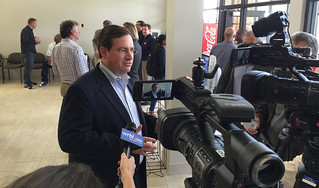Auburn University holds grand opening for its new RFID Lab; announces joint project with Amazon
Article body
Auburn University's new RFID Lab held its grand opening Wednesday, during which Amazon announced a joint project with Auburn to explore the business case for the implementation of RFID within the Amazon supply chain.
At the event, Dave Clark, Amazon's senior vice president of worldwide operations, said, "RFID is a fascinating technology. As part of this joint project, we are excited to invent new processes and technology using RFID to enhance the experience for customers through better inventory predictability, faster delivery and, ultimately, lower cost. The collaboration presents a unique opportunity for students, faculty and industry to come together in a hands-on and fast-moving real world environment."
Auburn University's RFID Lab specializes in the business case and technical implementation of radio frequency identification technology in retail, supply chain and manufacturing settings. The lab draws on the expertise of faculty in Auburn University's Raymond J. Harbert College of Business, Samuel Ginn College of Engineering, College of Human Sciences and College of Agriculture. In moving to Auburn University in 2014, the lab was reunited with its founder, Harbert College of Business Dean Bill Hardgrave. Hardgrave helped launch the lab at the University of Arkansas in 2005.
Even though its location has changed, the lab has continued to work with leading retail, supply chain, manufacturing and technology companies.
"As the RFID industry expands, it's important to have as many users engaged in the lab as possible as lessons from one industry often hold true for others," Auburn University RFID Lab Director Justin Patton said. "Having unique retail partners like Amazon engaged in the lab allows us to focus on the research questions that are most crucial to many different users, and add the academic validation that helps bring maturity to the evolving market."
Amazon has utilized RFID technology in its fulfillment centers, the massive facilities where customer orders are picked from shelves, moved on conveyers and loaded onto trucks for rapid shipping and delivery. Founded in 1994 and based in Seattle, the company's footprint includes more than 100 fulfillment centers worldwide.
Located in a former supermarket, the 13,000-square foot Auburn University RFID Lab offers simulated retail, grocery and convenience store space, as well as warehouse and distribution center environments. The Auburn University RFID Lab established the first RFID "tagged item certification program" to assist retail product manufacturers. RFID technology utilizes computer chips smaller than a grain of sand to aid in the wireless tracking of items.
Related Media
Related Links
Media interested in this story can contact Communications Director Preston Sparks at (334) 844-9999 or preston.sparks@auburn.edu.
Auburn University is a nationally ranked land grant institution recognized for its commitment to world-class scholarship, interdisciplinary research with an elite, top-tier Carnegie R1 classification, life-changing outreach with Carnegie’s Community Engagement designation and an undergraduate education experience second to none. Auburn is home to more than 30,000 students, and its faculty and research partners collaborate to develop and deliver meaningful scholarship, science and technology-based advancements that meet pressing regional, national and global needs. Auburn’s commitment to active student engagement, professional success and public/private partnership drives a growing reputation for outreach and extension that delivers broad economic, health and societal impact.





